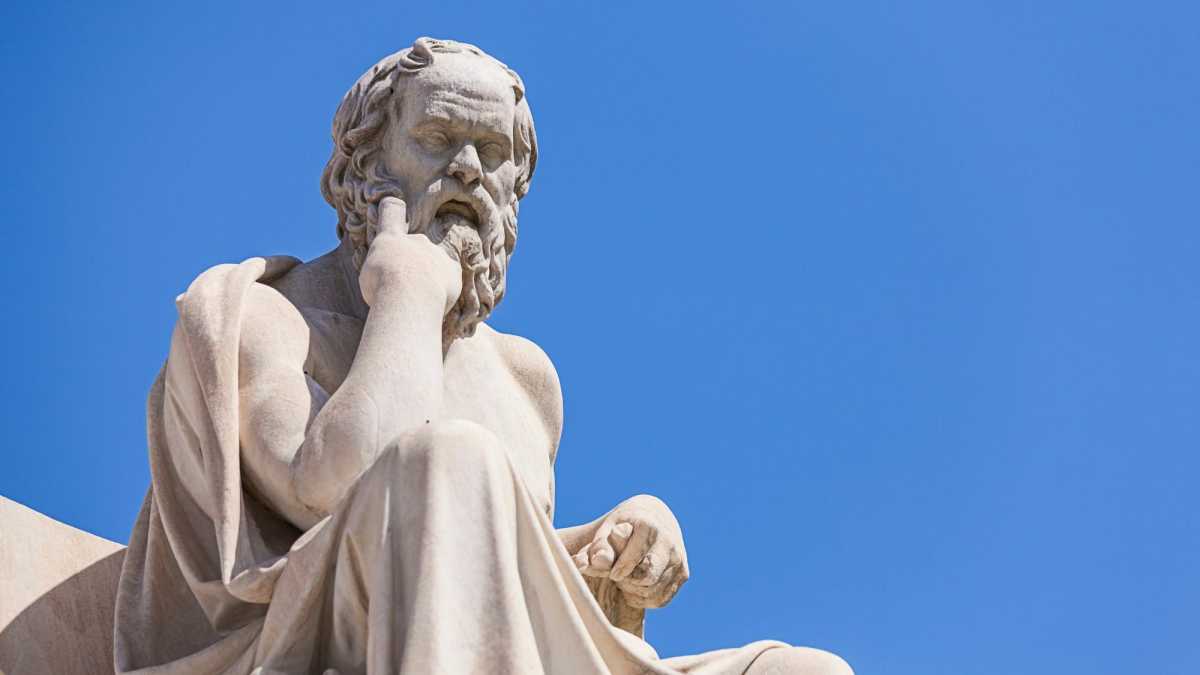Philosophy quotes have a unique way of capturing profound wisdom in just a few words. These quotes distil complex ideas into memorable, thought-provoking statements that have stood the test of time. Understanding these quotes can be incredibly beneficial for personal growth and critical thinking. They provide insights into human nature, ethics, existence, and knowledge, encouraging us to reflect on our beliefs and behaviours.
- Blogs
- General Knowledge
- Famous Philosophy Quotes Explained 665d665ebdccdd0001d2fc7c
Famous Philosophy Quotes Explained
General Knowledge • 3 Jun, 2024 • 17,763 Views • ⭐ 1.8
Written by Shivani Chourasia

Philosophy quotes encapsulate profound wisdom in concise statements. They offer a window into the minds of great thinkers, providing snapshots of their most influential ideas. These quotes are often easy to remember, making them powerful tools for contemplation and discussion.
In modern life, philosophy quotes remain relevant because they address timeless human concerns. They offer guidance on how to live a good life, how to understand the world, and how to navigate complex moral landscapes. By reflecting on these quotes, we can gain new perspectives, challenge our assumptions, and find inspiration for personal and intellectual growth.
GENERAL KNOWLEDGE QUIZ • 10 QUESTIONS • 2 MINS
We've got a General Knowledge quiz for you!
TAP TO PLAY

Famous Philosophy Quotes Explained in Detail
"The unexamined life is not worth living." - Socrates

- Philosopher: Socrates, an ancient Greek philosopher.
- Historical Context: This quote comes from Plato's "Apology," where Socrates defends himself during his trial for impiety and corrupting the youth.
- Explanation: Socrates emphasizes the importance of self-reflection and critical thinking. He believed that living a life without questioning and examining one's beliefs, actions, and purpose is devoid of meaning. This approach to life encourages a continuous pursuit of knowledge and self-improvement.
- Relevance: In contemporary life, this quote inspires individuals to engage in introspection and seek a deeper understanding of themselves and their motivations. It encourages a mindset of lifelong learning and personal growth.
"I think, therefore I am." - René Descartes

- Philosopher: René Descartes, a French philosopher and mathematician.
- Historical Context: This statement is from Descartes' work "Meditations on First Philosophy," where he establishes a foundation for scientific and philosophical inquiry.
- Explanation: Descartes asserts that the very act of doubting one's existence serves as proof of the reality of one's mind. This foundational thought emphasizes the importance of rationality and consciousness in establishing personal existence.
- Relevance: This quote highlights the importance of self-awareness and rational thought. It reminds us that our ability to think and reason is central to our identity and understanding of the world.
"He who has a why to live can bear almost any how." - Friedrich Nietzsche

- Philosopher: Friedrich Nietzsche, a German philosopher.
- Historical Context: Nietzsche wrote this in his book "Twilight of the Idols." The idea is further elaborated in Viktor Frankl's "Man's Search for Meaning."
- Explanation: Nietzsche suggests that having a purpose or meaning in life provides the strength to endure difficult circumstances. The "why" gives people the motivation to overcome challenges and hardships.
- Relevance: In modern life, this quote encourages individuals to find and pursue their purpose. It serves as a reminder that having a clear sense of direction can provide resilience in the face of adversity.
"The only thing I know is that I know nothing." - Socrates

- Philosopher: Socrates, an ancient Greek philosopher.
- Historical Context: This paradoxical statement is attributed to Socrates and is documented by his student Plato.
- Explanation: Socrates' admission of his ignorance is a demonstration of intellectual humility. It underscores the importance of recognizing the limits of one's knowledge and remaining open to new learning.
- Relevance: This quote is a call to embrace curiosity and continuous learning. It encourages a mindset that values questioning and exploring rather than clinging to false certainties.
"To be is to be perceived." - George Berkeley

- Philosopher: George Berkeley, an Irish philosopher.
- Historical Context: Berkeley presented this idea in his work "A Treatise Concerning the Principles of Human Knowledge."
- Explanation: Berkeley argues that existence is fundamentally tied to perception. Objects only exist to the extent that they are perceived by the mind.
- Relevance: This quote challenges our understanding of reality and perception. It invites reflection on how our experiences and awareness shape our understanding of existence.
"Man is condemned to be free." - Jean-Paul Sartre

- Philosopher: Jean-Paul Sartre, a French existentialist philosopher.
- Historical Context: Sartre explores this concept in his work "Being and Nothingness."
- Explanation: Sartre suggests that humans are inherently free to make choices, but with this freedom comes the burden of responsibility. There are no external determinants for our actions, leaving us responsible for our choices.
- Relevance: In contemporary life, this quote emphasizes personal responsibility and the weight of our choices. It encourages individuals to embrace their freedom and take ownership of their actions.
"Happiness is not an ideal of reason, but of imagination." - Immanuel Kant

- Philosopher: Immanuel Kant, a German philosopher.
- Historical Context: This quote is from Kant's "Critique of Pure Reason."
- Explanation: Kant distinguishes between the roles of reason and imagination in the pursuit of happiness. He suggests that happiness is a subjective experience that cannot be fully captured by rational thought alone.
- Relevance: This quote reminds us that happiness is a complex, imaginative state that goes beyond logical reasoning. It encourages the appreciation of emotional and creative aspects of life in seeking fulfilment.
"The greatest happiness of the greatest number is the foundation of morals and legislation." - Jeremy Bentham

- Philosopher: Jeremy Bentham, an English philosopher and social reformer.
- Historical Context: This principle is central to Bentham's utilitarian philosophy, as outlined in his works on ethics and political theory.
- Explanation: Bentham's utilitarianism asserts that the best actions or policies are those that promote the greatest happiness for the largest number of people.
- Relevance: This quote highlights the importance of considering the collective well-being in ethical and political decision-making. It remains a foundational idea in discussions of morality and public policy.
"You can discover more about a person in an hour of play than in a year of conversation." - Plato

- Philosopher: Plato, an ancient Greek philosopher.
- Historical Context: While the exact source of this quote is debated, it is often attributed to Plato, reflecting his views on education and human behaviour.
- Explanation: Plato suggests that play reveals fundamental aspects of a person's character and nature. Through play, individuals express themselves more freely and authentically.
- Relevance: This quote underscores the value of observing behaviour in informal, playful contexts to gain deeper insights into someone's true character.
"God is dead! He remains dead! And we have killed him." - Friedrich Nietzsche

- Philosopher: Friedrich Nietzsche, a German philosopher.
- Historical Context: This provocative statement appears in Nietzsche's work "The Gay Science."
- Explanation: Nietzsche is not proclaiming the death of a deity but rather addressing the decline of religious and metaphysical beliefs in the modern world. He argues that the loss of these beliefs creates a moral and existential void.
- Relevance: This quote challenges individuals to confront the implications of living in a world without traditional religious or moral frameworks. It encourages the search for new sources of meaning and values in a secular age.
How to Reflect on Philosophy Quotes

Reflecting on philosophy quotes involves more than just reading them. Here are some tips to deepen your engagement:
- Contemplate the Meaning: Take time to think deeply about what the quote means and how it applies to your life.
- Contextualize the Quote: Research the background and the philosopher who said it to understand the broader context.
- Discuss with Others: Engage in conversations with friends or online communities to explore different interpretations.
- Journal Your Thoughts: Write down your reflections and how the quote resonates with your experiences.
- Apply the Wisdom: Consider how you can incorporate the insights from the quote into your daily actions and decisions.
Online Resources for Exploring Philosophy Quotes

There are numerous online resources where you can explore more philosophy quotes and engage with a community of thinkers:
- BrainyQuote: A comprehensive collection of quotes from various philosophers, with an easy-to-use search feature.
- Goodreads: Offers a vast array of quotes with user discussions and ratings, providing a platform for sharing and discovering new quotes.
- Stanford Encyclopedia of Philosophy (plato.stanford.edu): Provides detailed articles and context for many philosophical ideas and quotes.
- Internet Encyclopedia of Philosophy (iep.utm.edu): Offers in-depth explanations of philosophical concepts and the context of notable quotes.
- Philosophy Now (philosophynow.org): A magazine dedicated to philosophical ideas, featuring articles and discussions on various quotes and thinkers.
- Reddit’s r/philosophy: A community where users share and discuss philosophical quotes and their interpretations.
- Philosophy Stack Exchange: A Q&A platform where users can ask detailed questions about philosophy quotes and receive answers from knowledgeable members.
Conclusion
Philosophy quotes offer timeless wisdom that continues to resonate in modern life. By exploring and reflecting on these quotes, we can gain profound insights into human nature, ethics, and existence. Encouraging contemplation and discussion of these quotes can lead to greater personal growth and critical thinking. As you delve into the world of philosophy quotes, consider how their wisdom can enhance your understanding of life and inspire you to think more deeply about the world around you.
Test your General Knowledge! Visit:
https://www.quizzop.com/general-knowledge-quiz/category
Rate this article
Other articles you may like
Buddha Purnima 2024: Celebrating Buddha's Legacy
General Knowledge • 21 May, 2024 • 27,846 Views

The Evolution and Significance of Iconic Logos
General Knowledge • 15 May, 2024 • 33,270 Views

Celebrating Mother's Day: A Global Tribute
General Knowledge • 10 May, 2024 • 32,287 Views

Celebrating May Day: Unity and Rights
General Knowledge • 26 Apr, 2024 • 41,146 Views

Earth Day 2024: Global Commitment & Action
General Knowledge • 22 Apr, 2024 • 42,734 Views





